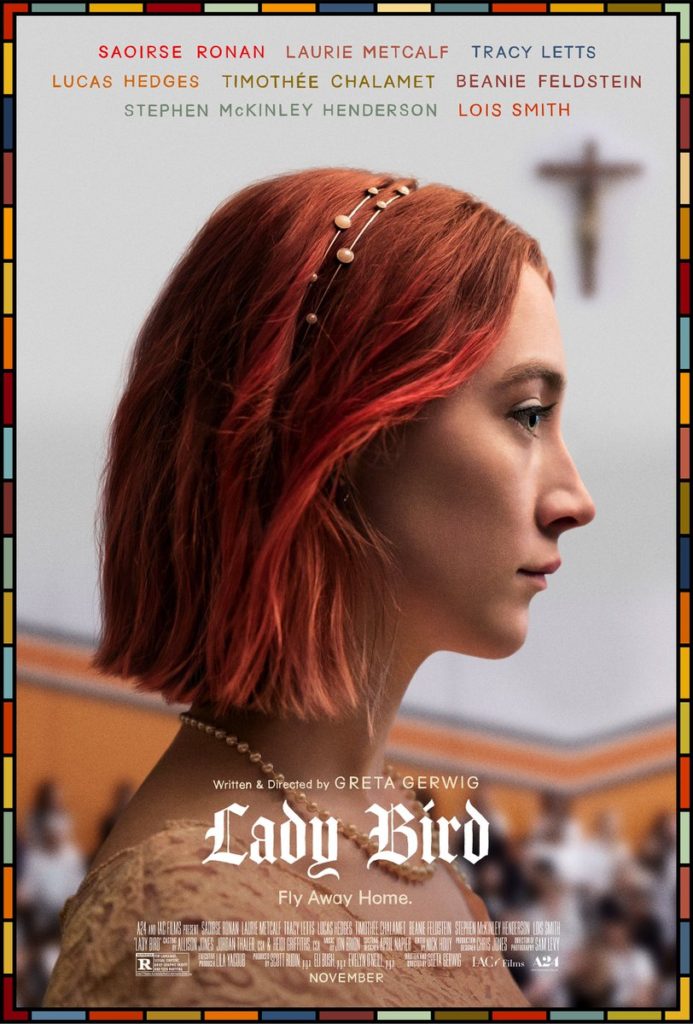 “I hate California…I want to go where culture is like, New York, or Connecticut or New Hampshire,” declared Christine “Lady Bird” McPherson, with vigor, to her mother. Our showing in New Haven, Conn. certainly shared a laugh at her naivety, her missive proving she’s never heard the “grass is always greener” proverb. For whatever Lady Bird’s titular character may lack, her heart and her struggles are valid, relatable even. “I wish I could live through something,” she emotes. Don’t we all.
“I hate California…I want to go where culture is like, New York, or Connecticut or New Hampshire,” declared Christine “Lady Bird” McPherson, with vigor, to her mother. Our showing in New Haven, Conn. certainly shared a laugh at her naivety, her missive proving she’s never heard the “grass is always greener” proverb. For whatever Lady Bird’s titular character may lack, her heart and her struggles are valid, relatable even. “I wish I could live through something,” she emotes. Don’t we all.
Lady Bird, the directorial debut of mumblecore queen Greta Gerwig (Hannah Takes the Stairs, Frances Ha), plays out like the outline of Gerwig’s bio. Lady Bird (Saoirse Ronan) is a high school senior growing up in Sacramento, Calif. She’s moody and flawed, but honest, a snapshot of American youth trying to find its way. She encapsulates girlhood to a T, dreaming in impossibilities, yearning to escape from where she grew up, and fighting with her resolute, panicked mother played by Laurie Metcalf in a tour de force showing.
Christine renames herself “Lady Bird,” in a small display of individuality and rebellion against her mother. She wants to go to college in New York, but her mother is vehemently against it due to money concerns and her husband’s job loss. True to life of many American teenagers, Lady Bird pushes onward, only able to see her own wants, needs, and struggles. She joins a theater program to get in touch with her creative side. She steals and discards her teacher’s grade book in order to negotiate a higher grade later. She seeks her father’s help with financial aid forms and applies to schools behind her mom’s back. We watch her stumble socially through loads of teenage problems that include prom, cool kids, kissing, and sex. Ronan perfectly understands Gerwig’s script, and doles out a character who is confused by the growing pains and complexities she faces, but follows her heart anyways because that’s all she knows how to do.
The mother-daughter relationship depicted on screen is tense, though not devoid of love and attention, which the film outwardly suggests might be the same things. Mom Marion is working double shifts to keep her family afloat; Lady Bird thanks her by being Emo, jumping out of a moving car, and writing “Fuck You Mom” on her newly adorned pink cast. Metcalf’s disposition is stone cold. Despite her frostiness, she’s trying to bring her quixotic daughter back to reality, a reality dictated by grades, extra curricular activities, motivation. For Lady Bird and Marion, it’s a constant tug of war on who is “right” but there’s never a defining answer…no hero and no villain. Lady Bird can be selfish and bratty, while her mother is stressed and stubborn. Marion’s view can be harsh; she’s unsure of the type of daughter she raised and worries that Lady Bird might be viewed as trash. I can’t speak from experience (I’m both male and sister-less), but mother-daughter relationships seem to be one of the most complicated forms of love in this world.
With her heaps of art-house cred, Gerwig delivers a rousing and real coming of age story that most likely mirrors her own experience in California’s capital. With Lady Bird, she crafts a believable story of what it’s like to take that first step toward adulthood despite a myopic viewpoint and an aversion to a life so cleanly laid out. While Lady Bird, the character, can be frustrating, she’s also incredibly endearing, so much so that you ultimately want to root for her, shortcomings and all. The film dissects middle class weariness and examines whether or not we should accept the hand we’re dealt at face value. Or rather, do we rename ourselves, take a leap, and learn to fly? Grade: A-


